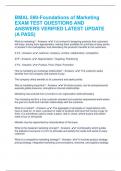Exam (elaborations)
BMAL 590-Foundations of Marketing EXAM TEST QUESTIONS AND ANSWERS VERIFIED LATEST UPDATE (A PASS)
- Course
- Institution
BMAL 590-Foundations of Marketing EXAM TEST QUESTIONS AND ANSWERS VERIFIED LATEST UPDATE (A PASS) What is marketing? - Answers - It is involved in designing products that customers will enjoy, pricing them appropriately, making them available for purchase at easy points of access in the marketpl...
[Show more]



